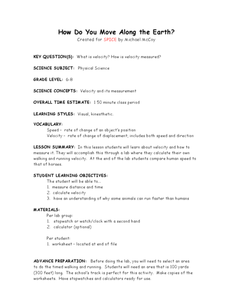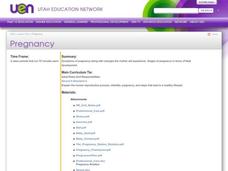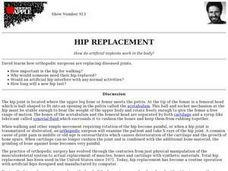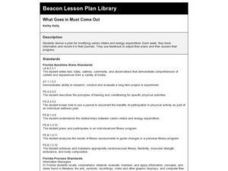Curated OER
Skeletal, Skin, and Muscular Systems
Eighth graders explain the functions of various body systems. Using a concept map, 8th graders identify and explain the fuctions of the skeletal, skin, and muscular systems of the body. After completing their concept map, students...
Curated OER
Jumpy Dolls
Students are challenged to design and construct a jointed figure that moves in a motion something like jumping jacks when a string is pulled.
Curated OER
How Do You Move Along the Earth?
Young scholars determine their own walking and running velocity. In this physics lesson, students calculate velocity using distance and time information. They compare human and animal speeds.
Curated OER
All About Birds
Pupils study different kinds of birds, and demonstrate reading comprehension skills, including reading strategies, inference, literal meaning, and critical analysis.
Curated OER
School Meals
Seventh graders identify three categories of calcium-rich dairy foods and compare the amount of calcium available in dairy foods versus vegetables. They explain the importance of dairy foods in their diets and identify at least one...
Curated OER
Discovering Owls
Students are introduced to different types of owls and owl pellets. They list several adaptations that benefit the owls. Students identify the various species of owl that live in Wisconsin. Students discuss owl pellets and identify the...
Curated OER
Connecting School Meals to Classroom Learning
Students examine the impact of dairy nutrients. For this nutrition lesson, students participate in interactive activities that require them to consider how much calcium their bodies need. Students also visit the school cafeteria and...
Curated OER
Lungs: The Breathing Machine
Students create a model of the lungs and diaphragm. In this breathing lesson, students create a model out of a plastic bottle and balloons. They see how the diaphragm helps to fill the lungs with air.
Curated OER
What is ergonomics and why is it important?
Students come up with ideas to help friendly, superintelligent space aliens adapt to this environment.
Curated OER
Exercise: The Right Stuff
First graders explore how regular exercise keeps the body strong and healthy.
Curated OER
Designasaurus: Modeling Activity for a Paleoartist
Pupils create and draw fictional dinosaurs. They write a description of their dinosaur.
Curated OER
Health: Symptoms and Stages of Pregnancy
Students examine the growth and changes that occur during the three trimesters of pregnancy. Issues such as toxemia and spontaneous abortion are also considered. In groups, students rotate to various stations exploring aspects related...
Curated OER
Pregnancy
Pupils view a PowerPoint presentation about pregnancy. They work in groups to complete activities at each of six stations. Students create a baby from clay dough. They use construction paper to design a quilt square. Pupils complete a...
Curated OER
They Don't Just Eat Grass
Students explore and examine different types of feed used for livestock. They discuss types of feed, the need for energy and health, and create graphs of food compared to categories. Students organize data and complete worksheets on...
Curated OER
Forensics: Who Killed the Iceman?
Learners explore how archaeologist examine mummies. In this research based instructional activity, students work in groups to research two mummies and report their findings to the class through role-playing and using a model of the mummy.
Curated OER
Promoting Daily Fitness; Mini Game
Young scholars evaluate human health by completing an interactive activity on the Internet. In this food choice instructional activity, students identify a list of foods which can make you unhealthy and sick compared to a list of...
Curated OER
Hip Replacement
Students take a close examine animals' skeletons to see how their pelvis and femur work together for movement. By investigating their skeletons students discover the placement and functions of our own bodies. They use owl pellets in this...
Curated OER
Tendon Damage from Steroids
Students explain how using steroids can create problems for tendons in your body.
Curated OER
Thanksgiving: Bird Evolution
High schoolers explore the evolution of birds. In this biology lesson, students research articles that discuss evidence about the ancestry of birds. They discuss their findings with the group and draw a journal magazine cover...
Curated OER
Prince Waffle's Grain Group
Second graders participate in activities focusing on the grain group and food prices.
Curated OER
Make Sense of Nature
Learners participate in this program that heightens their awareness and curiosity of nature as well as their sense of adventure and exploring new surroundings. They identify and choose an object from nature after exploring it with other...
Curated OER
Health and Nutrition
Fifth graders explore nutrition and health ideas to maintain their energy. In this energy lesson, 5th graders read information about ways to keep their energy boosted. Students keep a diary of what they each and create a chart for the...
Curated OER
What Goes in Must Come Out
Learners monitor their calorie intake and energy expenditure. They keep track of daily data in a journal and assess and adjust their diets as appropriate.
Other popular searches
- Muscles and Bones
- Muscles Bones
- Health Bones and Muscles
- Human Bones Muscles
- Muscles and Bones Quiz
- My Bones and Muscles
- Bones and Muscles Lab
- Human Bones and Muscles
- Bones and Muscles Models
- Fitness Bones and Muscles
- Bones and Muscles Worksheet
- Bones and Muscles in Space

























